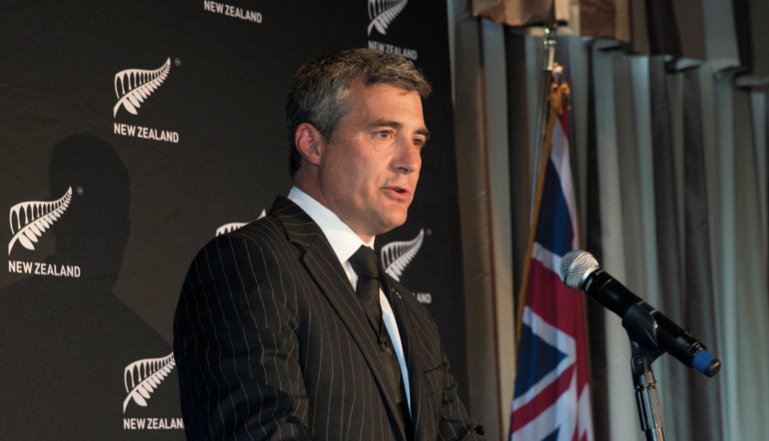

New Zealand consul general Leon Grice is looking to fatten the pipe between New Zealand and the West Coast of the US. James ?Robinson chews the fat.
When Leon Grice was appointed New Zealand’s consul general in Los Angeles in 2012 it was intended to shake things up and bring a business approach to the diplomatic sphere.
Grice has been in business for himself since 1995, founding Busby Ramshaw Grice and later on, Twenty4 Media. In 2009 he was picked to run the government’s New Zealand 2011 programme around the recent Rugby World Cup, an opportunity that then led directly to this latest opportunity.
The consul general role is a work in progress, Grice says, sitting in the sun outside New Zealand’s US West Coast offices in Santa Monica.
Partly, Grice was deposed to America to oversee our film industry interests in America and help leverage our national profile around the America’s Cup in San Francisco. But he was also sent here to “fatten the pipe” – as he describes it – and create more meaningful business links between New Zealand and the West Coast of America.
It is a brand of entrepreneurial diplomacy, as Grice lays it out – looking for shared areas of interest and untapped potential.
“My starting point is, ‘what makes us relevant to America?’ Not everything we do is the best. You have to find the touch points where we have the lead,” Grice says.
Grice’s job has been made easier because Americans are more interested in our intellectual property than ever before.
He’s entered into his post following an uninterrupted, decade-long spike in the export of commercial services from New Zealand (defined as being everything we sell internationally, outside of tourism and education, that doesn’t travel through a port).
Commercial services exports have ticked upwards at around eight percent for 10 years, Grice says. The flow of milk and meat into the United States has been flat for a while, while the trade of royalties and software licenses, for example, is booming.
Grice says at $940 million, the USA is our second largest market for commercial services, bumping up closely now against Australia. Two democratic countries with strong court systems in place will always be natural trading partners for these types of services, he adds.
This peak has occurred against the backdrop of a paradigm shift in how both Americans and New Zealanders view their respective international opportunities. “Today, West Coast Americans are automatically thinking globally. They don’t believe all the best ideas come from the US and they’re not prepared to build businesses that don’t have global reach,” Grice says.
America companies also no longer look towards international acquisitions as a chance to simply gut assets and move on.
New Zealanders, Grice says, are simultaneously starting to accept that a split needs to happen between locally based research and development and international sales and marketing. Our local businesses will always be boxed in trying to find scalability while staying onshore and can’t build up huge value by trialing a product domestically.
“It was a lot harder to explain the value in that split 10 years ago. I think we are growing up in that regard,” Grice says.
It’s a new model that Grice thinks can’t be taught. “It’s less about government telling people than peers telling people,” he says.
In this vein, Grice nods to international success stories like Xero and BookTrack, who have used American capital to globalise homegrown genius as being “trailblazers” that will help light a path for future entrepreneurs.
Grice sees his role as strengthening these existing bonds alongside finding new potential.
An area where New Zealand is way behind America – and where Grice is eager to make a mark as Consul General – is setting up not-for- profit and philanthropic business structures to amp up our opportunities States-side.
As an example, Grice says that New Zealand- made technology around water management in the Lake Taupo area is some of the best in the world. Potentially, American conservationists would have a large interest in this.
“There are people who would give money for that. But you need to build the structures and the funding for the transfer of science and intellectual property,” Grice says.
For Grice though, his role is not just about increasing this economic traffic between New Zealand and the West Coast of the USA. He views boosting cultural integration as an important component of his work, too.
“There is a love affair here between the United States and New Zealand and I don’t think New Zealanders have really cottoned onto that. On the West Coast here there’s an immediate Pacific connection,” Grice says.
Which from an opposite end, can sometimes mean Grice’s job is to help Americans understand our Kiwi business quirks.
“In San Francisco across the America’s Cup a lot of New Zealand entrepreneurs were pitching their businesses. Too often we would apologise for ourselves in this setting. And
I can’t think of a better way to destroy expectations here,” Grice says.
“You have to get Americans to understand that there are nuggets in New Zealand and how you can bring those out.”




